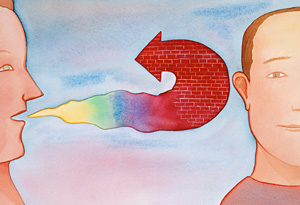How to Deal with Difficult (Even Impossible) People

Photo: Stockbyte/Thinkstock
She thinks you're having a conversation, but you don't get to speak a word. Something doesn't go according to plan and you're the one he blames. Whether it's a family member, a co-worker or (worse) your boss, highly aggressive and challenging people can turn a perfectly good day into a dramatic experience without any reason. When walking away is not an option, what do you do?
We have all met people who are so prickly and difficult that no one wants to handle them. In most situations, walking away is an option, and you escape with no more than ruffled feathers. But some situations are inescapable. You can wait until the thorny personality is gone and moan "She's just impossible" to a friend. Far better, though, to begin to develop skills in practical psychology.First, take responsibility for your part of the interaction. Animosity is created in your own heart. Even the most impossible person had a mother. He was loved by somebody. If you can deal with your own reaction and take responsibility for it, no step is more productive. Detachment is always the best response, because if you can interact without having a reaction, you will be clear-headed enough to make progress in relating to this difficult person.
Next, try to name what specifically causes the difficulty. Is the person clinging, controlling, competitive? We all tend to use descriptive words loosely, but it helps to know exactly what is going on.
- Clinging types want to be taken care of and loved. They feel weak and are attracted to stronger people. If desperate, they will cling to anyone.
- Controlling types have to be right. There is always an excuse for their behavior (however brutal) and always a reason to blame others. Controlling people are perfectionists and micro-managers. Their capacity to criticize others is endless.
- Competitive types have to win. They see all encounters, no matter how trivial, as a contest. Until they win, they won't let go.



